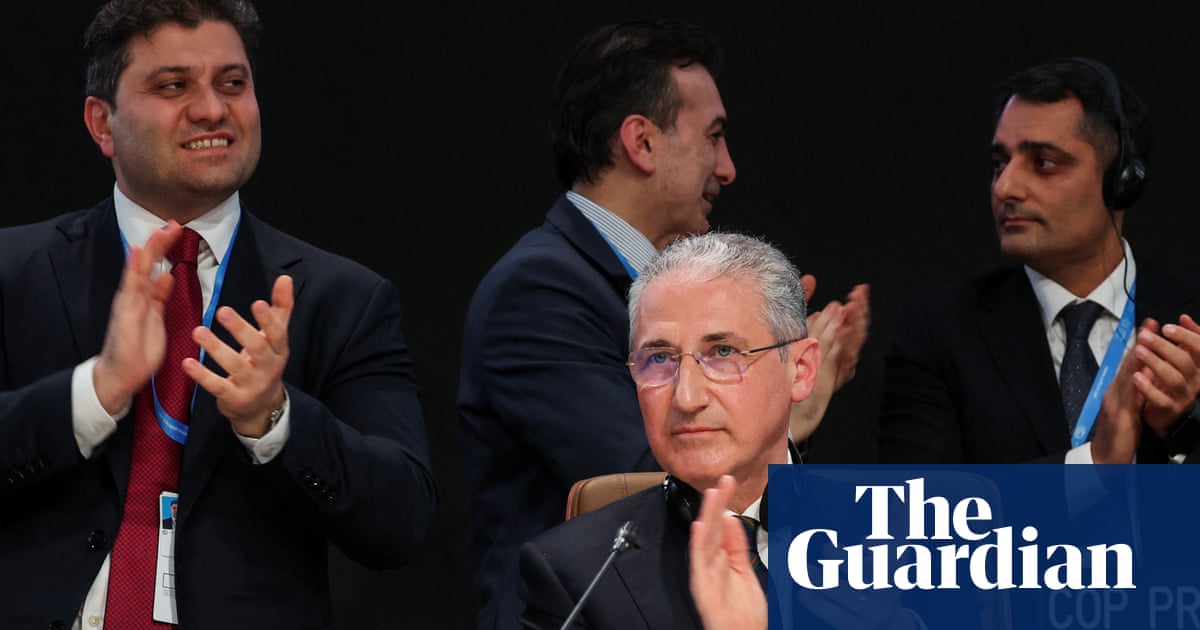Rich and poor countries concluded a trillion-dollar deal on the climate crisis in the early hours of Sunday morning, after marathon talks and days of bitter recriminations ended in what campaigners said was a “betrayal”.
The developing world will receive at least $1.3tn (£1tn) a year in funds to help them shift to a low-carbon economy and cope with the impacts of extreme weather, by 2035.
But only $300bn of that will come in the form they are most in need of – grants and low-interest loans from the developed world. The rest will have to come from private investors and a range of potential new sources of money, such as possible levies on fossil fuels and frequent flyers, which have yet to be agreed.
Mohamed Adow, director of the Power Shift Africa thinktank, said: “This [summit] has been a disaster for the developing world. It’s a betrayal of both people and planet, by wealthy countries who claim to take climate change seriously. Rich countries have promised to ‘mobilise’ some funds in the future, rather than provide them now. The cheque is in the mail. But lives and livelihoods in vulnerable countries are being lost now.”
Some of the world’s poorest and most vulnerable countries fought hard during two weeks of fraught negotiations at the Cop29 UN summit in Azerbaijan’s capital Baku for a bigger slice of the money to come directly from developed countries. They also wanted more of the available finance to go to the countries most in need, instead of being shared with bigger emerging economies, such as India.
Two groups of particularly vulnerable nations, the Alliance of Small Island States and the Least Developed Countries, walked out of one meeting in protest late on Saturday afternoon, but later returned.
The talks were high-stakes from the start, as they opened just days after Donald Trump won re-election as US president. Trump intends to withdraw the US from the Paris agreement when he takes office in January and is likely to be hostile to providing any climate finance to the developing world.
Faced with the prospect of reconvening next year with a Trump White House in place, many countries decided that failure to agree on a new financial settlement in Baku was too much of a risk.
Developed countries insisted they could not offer any more, owing to their own budgetary constraints. “We will shoulder all the risk” if the US fails to contribute to climate finance in future, pointed out one negotiator.
Many developing world countries, including India, Bolivia, Cuba and Nigeria, reacted furiously to the deal.
Green campaigners also slammed the deal. Claudio Angelo, of the Observatorio do Clima in Brazil, said: “Rich countries spent 150 years appropriating the world’s atmospheric space, 33 years loitering on climate action, and three years negotiating [a financial settlement] without putting numbers on the table. Now, with the help of an incompetent Cop presidency and using the forthcoming Trump administration as a threat, they force developing countries to accept a deal that not only doesn’t represent any actual new money but also may increase their debt.”
India raised last-minute objections but failed to prevent it from being gavelled through by the Cop president, Azerbaijan’s environment minister Mukhtar Babayev. The country said it “could not accept” the settlement.
The host country was strongly criticised for its running of the Cop. Oil and gas make up 90% of Azerbaijan’s exports and fossil fuel interests were highly visible at the talks.
after newsletter promotion
Saudi Arabia also played a highly obstructive role, according to many insiders. In one extraordinary development, a Saudi official attempted to alter one key text without full consultation. The petro-state also tried repeatedly to remove references to the “transition away from fossil fuels” which was agreed at last year’s Cop28 summit.
“It was clear from day one that Saudi Arabia and other fossil fuel-producing countries were going to do everything in their power to weaken the landmark Cop28 agreement on fossil fuels. At Cop29 they have deployed obstructionist tactics to dilute action on the energy transition,” said Romain Ioualalen, of the pressure group Oil Change International.
The US and China – the world’s two biggest economies, and biggest emitters of greenhouse gases – are normally key nations at the annual “conference of the parties” (Cop) under the UN framework convention on climate change. But neither played much of a public role in Baku, allowing other countries to drive the talks. The US delegation is still made up of officials from Joe Biden’s administration, but the looming presidency of Donald Trump cast a pall over their participation.
The deal will mean China will contribute to climate finance for the poor world voluntarily, unlike rich countries which are obliged to provide cash.
Ani Dasgupta, chief executive of the US-based World Resources Institute thinktank, said: “Despite major headwinds, negotiators in Baku eked out a deal that at least triples climate finance flowing to developing countries [from a previous longstanding goal of $100bn a year]. The $300bn goal is not enough, but is an important down payment toward a safer, more equitable future. The agreement recognises how critical it is for vulnerable countries to have better access to finance that does not burden them with unsustainable debt.”

